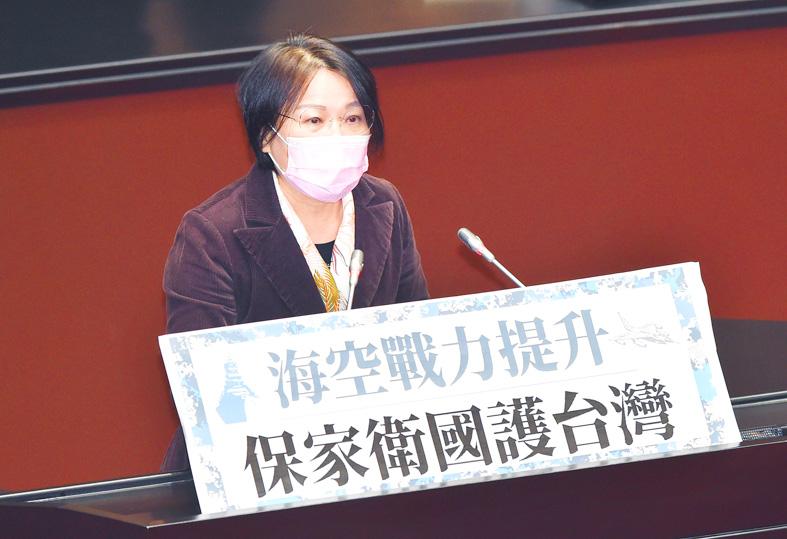Democratic Progressive Party Legislator Liu Shyh-fang (劉世芳) on Monday called on the government to treat Phoenix Television as a Chinese state-owned media company, after China’s State Council became a majority shareholder of the company.
State Council-funded Bauhinia Culture Holdings Ltd in April last year bought 21 percent of the shares of Hong Kong-based Phoenix Television, becoming a majority shareholder, Liu said.
Chinese state-owned China Mobile also owns 19.68 percent of Phoenix Television shares, Liu added.

Photo: Liao Chen-huei, Taipei Times
Phoenix operates in Taiwan and other countries outside of China, where it airs content in Mandarin and Cantonese.
“There is no private media company in China. The government must recognize that Phoenix Television is now under the control of the Chinese Communist Party [CCP],” she said.
In its latest report on Hong Kong, the Mainland Affairs Council said the investment in Phoenix was part of Beijing’s plans to control all publications and media in the territory.
However, Phoenix Television was already connected to the CCP before the investments, a source said.
Company founder and CEO Liu Changle (劉長樂) previously served as an officer and political instructor in the Chinese People’s Liberation Army, and later became a journalist for CCP-controlled China National Radio, the source said, adding that Liu is a standing member of the National Committee of the Chinese People’s Political Consultative Conference.
Xu Wei (徐威), the company’s board chairman, was formerly a Shanghai municipal government official, as well as China Central Television deputy director, the source said, adding that Xu is now responsible for content planning and production at Phoenix.
“As Phoenix is effectively a channel for CCP propaganda, its operations in Taiwan should be restricted under current laws,” the source said.
If recognized simply as a media company funded by Chinese investors, it would not be permitted to employ more than 10 Taiwanese, and if recognized as a Chinese state-owned media outlet it would not be permitted to hire any Taiwanese, the source said.
All of the employees at the Taiwan division of Phoenix are Taiwanese, the source said.
According to stipulations in the Measures Governing Investment Permits to the People of the Mainland Area (大陸地區人民來台投資許可辦法), Phoenix Television should already be considered a company funded by Chinese investment as more than 30 percent of its shares are owned by Chinese investors, Economic Democracy Union researcher Chiang Min-yen (江旻諺) said.

Eight restaurants in Taiwan yesterday secured a one-star rating from the Michelin Guide Taiwan for the first time, while three one-star restaurants from last year’s edition were promoted to two stars. Forty-three restaurants were awarded one star this year, including 34 in Taipei, five in Taichung and four in Kaohsiung. Hosu (好嶼), Chuan Ya (川雅), Sushi Kajin (鮨嘉仁), aMaze (心宴), La Vie by Thomas Buhner, Yuan Yi (元一) and Frassi in Taipei and Front House (方蒔) in Kaohsiung received a one-star rating for the first time. Hosu is known for innovative Taiwanese dishes, while Chuan Ya serves Sichuan cuisine and aMaze specializes

STATS: Taiwan’s average life expectancy of 80.77 years was lower than that of Japan, Singapore and South Korea, but higher than in China, Malaysia and Indonesia Taiwan’s average life expectancy last year increased to 80.77 years, but was still not back to its pre-COVID-19 pandemic peak of 81.32 years in 2020, the Ministry of the Interior said yesterday. The average life expectancy last year increased the 0.54 years from 2023, the ministry said in a statement. For men and women, the average life expectancy last year was 77.42 years and 84.30 years respectively, up 0.48 years and 0.56 years from the previous year. Taiwan’s average life expectancy peaked at 81.32 years in 2020, as the nation was relatively unaffected by the pandemic that year. The metric

Taiwan High Speed Rail Corp. (THSRC) plans to ease strained capacity during peak hours by introducing new fare rules restricting passengers traveling without reserved seats in 2026, company Chairman Shih Che (史哲) said Wednesday. THSRC needs to tackle its capacity issue because there have been several occasions where passengers holding tickets with reserved seats did not make it onto their train in stations packed with individuals traveling without a reserved seat, Shih told reporters in a joint interview in Taipei. Non-reserved seats allow travelers maximum flexibility, but it has led to issues relating to quality of service and safety concerns, especially during

A magnitude 5.1 earthquake struck Chiayi County at 4:37pm today, the Central Weather Administration (CWA) said. The hypocenter was 36.3km southeast of Chiayi County Hall at a depth of 10.4km, CWA data showed. There were no immediate reports of damage resulting from the quake. The intensity of the quake, which gauges the actual effect of a seismic event, measured 4 in Chiayi County, Tainan and Kaohsiung on Taiwan's seven-tier intensity scale, the data showed. The quake had an intensity of 3 in Chiayi City and Yunlin County, while it was measured as 2 in Pingtung, Taitung, Hualien, Changhua, Nantou and Penghu counties, the data